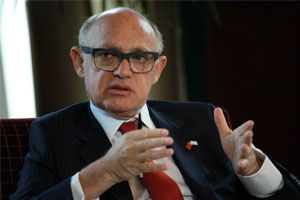China reiterates emission cut goal, reassures world
Updated: 2013-11-21 00:00
(chinadaily.com.cn)
|
||||||||
Xie Zhenhua, head of China's delegation to the Warsaw Climate Change Conference reiterated on Wednesday the country's goal of emission reduction, reassuring the world by its determination.
Xie said in his speech on the high level segment of the conferent that China will continue to step up with its effort in tackling climate change, and make sure that the commitment of reducing CO2 emission per unit of GDP by 40-45% by 2020 from 2005 level is fulfilled.
In the speech, Xie, also China's Vice-Chairman of the National Development and Reform Commission, stressed the funding is crucial for developing countries' actions of tackling climate change. "Without fulfillment of funding pledges, the multilateral mechanism will be challenged by severe crisis of trust," Xie added.
The following is the fulltext of Xie's speech on the High Level Segment of Warsaw Climate Change Conference.
Mr. President, Dear Colleagues, Ladies and Gentlemen,
On behalf of the Chinese government, I firstly would like to take this opportunity to thank the Government of Poland and its people for their effort in and historical contribution to hosting the Warsaw Conference. China fully associates itself with the Statement made by Fiji on behalf of G77 plus China.
This year has witnessed frequent extreme weathers worldwide, which has posed great threat to the living environment of hundreds of millions of people and caused tremendous economic losses. The Working Group I report of the Fifth Assessment Report released by the United Nations Intergovernmental Panel on Climate Change (IPCC) in last September fortifies the authenticity of global warming and the pressing need to address the challenge of climate change through scientific assessment. Science and facts have shown us that climate change has become a tangible and severe threat to sustainable development, and all countries should work hand in hand to tackle it through sincere cooperation. Thus, I would like to take this opportunity to make the following four points:
I. Stick to the Convention and identify clear target. The UNFCCC is the common commitment by all Parties to cooperate in addressing climate change, and the principles of equity, CBDR and respective capabilities are guidelines for the international community to act on. Five years ago, we gathered together in Poznan, and the negotiation process of Bali Roadmap set sail. Five years later when we meet again in Warsaw, the Bali process has taken in sail with certain gains. We should make concerted efforts and translate the outcomes in the documents of past COP/CMP meetings into real actions, so as to turn the Warsaw Conference into a meeting of Implementation.
II. Fulfill commitment and enhance mutual trust. Funding is the key for the success of Warsaw Conference. Funding is the foundation and precondition for developing countries' actions of mitigation, adaptation, loss and damage, technology development and transfer, capacity building and transparency. Without fulfillment of funding pledges, the multilateral mechanism will be challenged by severe crisis of trust. Developed countries must fulfill all the funding commitments they have made in past COP/CMP meetings, in particular they should make sure that the fund they provide from 2013 to 2015 should be no less than the fast-start fund, develop a clear roadmap for providing 100 billion USD each year by 2020, and capitalize the Green Climate Fund with public fund as the major source as soon as possible, so as to make sure there will be no gap in funding after 2013 and beyond.
III. Increase ambition and deliver hope. Mitigation ambition directly impacts the effectiveness of actions to address climate change, and targets in the second commitment period of the Kyoto Protocol are the scale to measure the emission-cutting ambition. The Warsaw Conference should urge all Parties, especially developed countries to ratify the Amendment to the second commitment period of KP as soon as possible, and at the same time to launch the review process in order to further raise mitigation ambition. Other developed countries should also raise their emission-cutting commitments in a comparable manner under the Convention. According to relevant researches, if developed countries follow the requirement of science by increasing their emission-cutting targets by 2020 to 40%, the so-called gap in emission-cutting effort will no longer exist. This should be the direction of our efforts.
IV. Make preparation for pragmatic progress. Over the past two years, the Parties have conducted effective exchanges under the ADP and made a good start by ensuring the guiding position of the principles and provisions of the Convention and developing an initial plan for the negotiation process. We should start the formal negotiation under the Durban Platform on the pillars of mitigation, adaptation, funding and technology in a balanced fashion, in accordance with the decisions made in Durban and Doha, conform to the principles and provisions of the Convention, and plan the negotiation in next year and future, so as to lay a right foundation for next comprehensive negotiations, send a positive signal to the international community and ensure that we can reach an agreement by 2015.
Ladies and Gentlemen,
China is the world’s largest developing country with a large population and imbalanced regional development. China is still in the process of industrialization and urbanization. China is faced with huge challenges of developing economy, eradicating poverty and improving the people’s livelihoods, as well as actively tackling climate change. In spite of great economic difficulties, the Chinese Government spares no efforts in controlling air pollution, actively tackling climate change to fulfill its commitment to the international society. Over the past 8 years, China has achieved a 26.4% drop of energy consumption per unit GDP,saved energy of 980 million tons of standard coal equivalent, reduced over 2.35 billion tons of CO2 and a 28% drop of carbon intensity. Share of non-fossil fuel in primary energy mix has reached 9.6%, size of renewable energy has ranked among top nations in the world, stock of forests has increased by 1.723 billion cubic meters, exceeding our target of 1.3 billion cubic meters. We’ve made our utmost contributions to the world in tackling climate change.
Since 2012, China has taken a series of new actions to addressing climate change. The year 2013 has witnessed two major events. First is the launch of the first National Low Carbon Day, which aimed at mobilizing the whole society to participate in actions to address climate change and practice a green and low carbon consumption mode and way of life. The second is the official operation of the pilot project of Shenzhen Carbon Exchange, which signals an important step forward in China’s carbon market development. While working hard domestically, China has actively carried out South-South cooperation in addressing climate change. China has provided 10 million USD each year to support capacity building in other developing countries for three consecutive years during 2011-2013, including hosting 28 training courses for other developing countries, which trained 800 government officials and technical personnel from 114 nations, donating over 900,000 energy-efficient lights, 100,000 energy-efficient air conditioners and 6000 household solar power generation systems.
Ladies and Gentlemen,
On the way to 2020, China will continue to step up with its effort in tackling climate change, and make sure that the commitment of reducing CO2 emission per unit of GDP by 40-45% by 2020 from 2005 level is fulfilled. We are now carrying out internal consultations and analysis for further enhanced actions, and will make positive contributions and unremitting efforts for global efforts in addressing climate change beyond 2020.
By following the principles of transparency, inclusiveness, party-driven and consensus through consultation, China will continue to play positive and constructive role together with all Parties to support Poland Government to make Warsaw Conference a success.
Thank you!
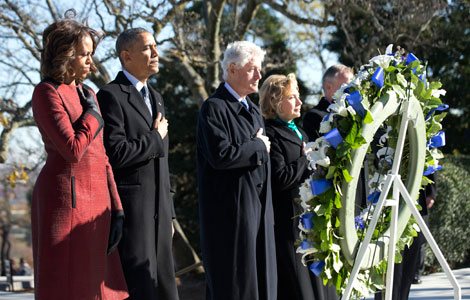
 Obama, Clintons honor Kennedy's assassination
Obama, Clintons honor Kennedy's assassination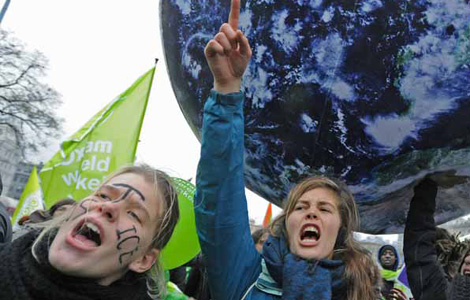
 China urges nations on climate funding
China urges nations on climate funding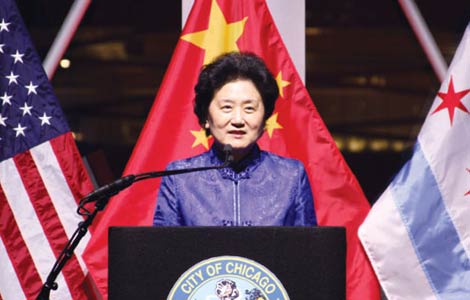
 Vice-Premier praises win-win ties
Vice-Premier praises win-win ties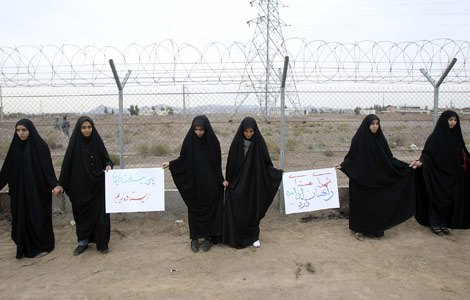
 Hopes rise for accord in nuclear negotiation
Hopes rise for accord in nuclear negotiation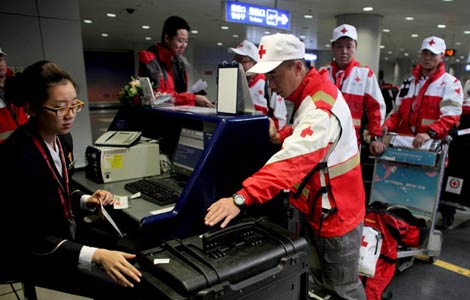
 Rescue team lands in Manila
Rescue team lands in Manila
 SCO meeting to focus on battling terrorism
SCO meeting to focus on battling terrorism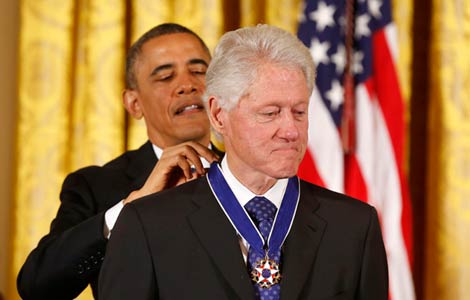
 Obama opens JFK tribute with freedom medals
Obama opens JFK tribute with freedom medals
 Syria's chemical weapons may be destroyed at sea
Syria's chemical weapons may be destroyed at sea
Most Viewed
Editor's Picks

|

|

|

|

|

|
Today's Top News
The supercomputer race has no finish line in sight
Chinese professionals 'lured by local enterprises'
Search firms to meet senior-manager shortage
Washington wines gain ground
Obama, Clintons honor Kennedy's assassination
China urges nations on climate funding
China appreciates Gary Locke's tenure
Chinese president seeks greater China-EU co-op
US Weekly

|

|
